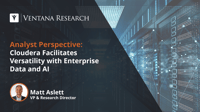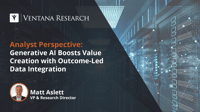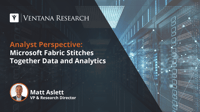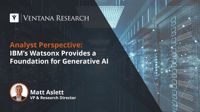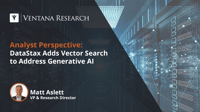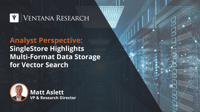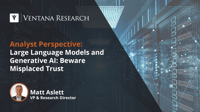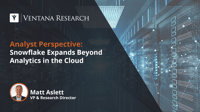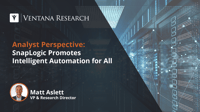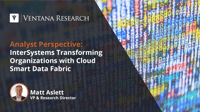The data platforms market may appear to have little or nothing to do with haute couture, but it is one of the data sectors most strongly influenced by the fickle finger of fashion. In recent years, various architectural approaches to data storage and processing have enjoyed a phase in the limelight, including data warehouse, data mart, data hub, data lake, cloud data warehouse, object storage, data lakehouse, data fabric and data mesh. These approaches are often heralded as the next big thing,...
Read More
Topics:
Cloud Computing,
Data Governance,
Data Management,
Data,
Digital Technology,
data operations,
AI & Machine Learning,
Analytics & Data,
Streaming Data & Events,
analytic data platforms,
Operational Data Platforms
Despite a focus on being data-driven, many organizations find that data and analytics projects fail to deliver on expectations. These initiatives can underwhelm for many reasons, because success requires a delicate balance of people, processes, information and technology. Small deviations from perfection in any of those factors can send projects off the rails.
Read More
Topics:
Analytics,
Business Intelligence,
Data Management,
Data,
Digital Technology,
data operations,
AI & Machine Learning
I have written before about the rising popularity of the data fabric approach for managing and governing data spread across distributed environments comprised of multiple data centers, systems and applications. I assert that by 2025, more than 6 in 10 organizations will adopt data fabric technologies to facilitate the management and processing of data across multiple data platforms and cloud environments. The data fabric approach is also proving attractive to vendors, including Microsoft, as a...
Read More
Topics:
business intelligence,
Analytics,
Cloud Computing,
Data Governance,
Data Management,
Data,
Digital Technology,
AI & Machine Learning,
Analytics & Data,
analytic data platforms
It is a mark of the rapid, current pace of development in artificial intelligence (AI) that machine learning (ML) models, until recently considered state of the art, are now routinely being referred to by developers and vendors as “traditional.” Generative AI, and large language models (LLMs) in particular, have taken the AI world by storm in the past year, automating and accelerating the development of content, including text, digital images, audio and video, as well as computer programs and...
Read More
Topics:
business intelligence,
Analytics,
Cloud Computing,
Data Governance,
Data,
Digital Technology,
natural language processing,
AI & Machine Learning,
Analytics & Data,
analytic data platforms
As I have previously explained, we expect an increased demand for intelligent operational applications infused with the results of analytic processes, such as personalization and artificial intelligence-driven recommendations. These systems rely on the analysis of data in the operational data platform to accelerate worker decision-making or improve customer experience.
Read More
Topics:
Analytics,
Data,
Digital Technology,
Streaming Analytics,
AI & Machine Learning,
Analytics & Data,
Streaming Data & Events,
Operational Data Platforms
The publication of Ventana Research’s 2023 Operational Data Platforms Value Index earlier this year highlighted the importance of incorporating analytic processing into operational applications to deliver personalization and recommendations for workers, partners and customers. This importance is being accelerated by interest in generative AI, especially large language models. The emergence of intelligent applications has impacted the requirements for operational data platforms with the need to...
Read More
Topics:
Analytics,
Cloud Computing,
Data,
Digital Technology,
AI & Machine Learning,
Analytics & Data,
analytic data platforms,
Operational Data Platforms
The data and analytics sector rightly places great importance on data quality: Almost two-thirds (64%) of participants in Ventana Research’s Analytics and Data Benchmark Research cite reviewing data for quality and consistency issues as the most time-consuming task in analyzing data. Data and analytics vendors would not recommend that customers use tools known to have data quality problems. It is somewhat surprising, therefore, that data and analytics vendors are rushing to encourage customers...
Read More
Topics:
Analytics,
Data Governance,
Data Management,
Data,
Digital Technology,
natural language processing,
AI & Machine Learning,
Analytics & Data
The data platforms market has traditionally been divided between products specifically designed to support operational or analytic workloads, with other market segments having emerged in recent years for data platforms targeted specifically at data science and machine learning (ML), as well as real-time analytics. More recently, we have seen vendor strategies evolving to provide a more consolidated approach, with data platforms designed to address a combination of analytics and data science, as...
Read More
Topics:
Analytics,
Business Intelligence,
Cloud Computing,
Data,
Digital Technology,
AI & Machine Learning,
Analytics & Data,
analytic data platforms,
Operational Data Platforms
Despite the emphasis on organizations being more data-driven and making an increasing proportion of business decisions based on data and analytics, it remains the case that some of the most fundamental questions about an organization are difficult to answer using data and analytics. Ostensibly simple questions such as, “how many customers does the organization have?” can be fiendishly difficult to answer, especially for organizations with multiple business entities, regions, departments and...
Read More
Topics:
Cloud Computing,
Data Management,
Data,
data operations,
AI & Machine Learning,
Analytics & Data
The shift from on-premises server infrastructure to cloud-based and software-as-a-service (SaaS) models has had a profound impact on the data and analytics architecture of many organizations in recent years. More than one-half of participants (59%) in Ventana Research’s Analytics and Data Benchmark research are deploying data and analytics workloads in the cloud, and a further 30% plan to do so. Customer demand for cloud-based consumption models has also had a significant impact on the products...
Read More
Topics:
business intelligence,
Cloud Computing,
Data Management,
Data,
natural language processing,
data operations,
AI & Machine Learning,
Analytics & Data,
analytic data platforms,
Operational Data Platforms
